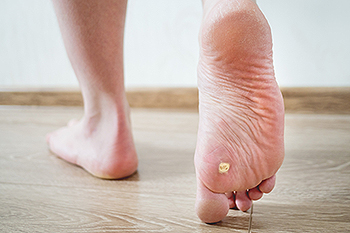

Plantar warts, often stealthy intruders on our feet, warrant a closer look to understand their nuances and origins. These warts, caused by the human papillomavirus, or HPV, appear on the soles of the feet. The HPV virus infiltrates the skin through tiny cuts or abrasions, thriving in warm, moist environments, such as communal showers or swimming pools. Plantar warts are characterized by their flat appearance and may have small black dots, often dubbed wart seeds, indicative of clotted blood vessels. The pressure applied to the soles while standing or walking makes these warts grow inward, causing discomfort. While plantar warts are generally harmless, they can be painful and stubborn. Understanding their definition and recognizing the causes including frequenting humid environments, compromised skin, or direct contact with the virus equips individuals to take proactive measures in preventing and addressing these pesky growths on their feet. If you have developed a plantar wart, it is suggested that you consult a podiatrist who can offer effective relief and treatment methods.
Plantar warts can be very uncomfortable. If you need your feet checked, contact Dr. Todd Goldberg from Complete Family Foot Care Center. Our doctor will assist you with all of your foot and ankle needs.
About Plantar Warts
Plantar warts are the result of HPV, or human papillomavirus, getting into open wounds on the feet. They are mostly found on the heels or balls of the feet.
While plantar warts are generally harmless, those experiencing excessive pain or those suffering from diabetes or a compromised immune system require immediate medical care. Plantar warts are easily diagnosed, usually through scraping off a bit of rough skin or by getting a biopsy.
Symptoms
Treatment
To help prevent developing plantar warts, avoid walking barefoot over abrasive surfaces that can cause cuts or wounds for HPV to get into. Avoiding direct contact with other warts, as well as not picking or rubbing existing warts, can help prevent the further spread of plantar warts. However, if you think you have developed plantar warts, speak to your podiatrist. He or she can diagnose the warts on your feet and recommend the appropriate treatment options.
If you have any questions please feel free to contact our office located in Littlestown, PA . We offer the newest diagnostic and treatment technologies for all your foot and ankle needs.